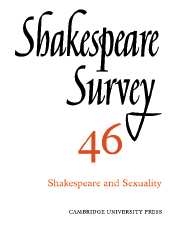Book contents
- Frontmatter
- Shakespeare and Sexuality
- As Who Liked It?
- Malvolio and the Eunuchs: Texts and Revels in Twelfth Night
- The Scandal of Shakespeare’s Sonnets
- Weaving and Writing in Othello
- ‘That’s She that was Myself’: Not-so-Famous Last Words and Some Ends of Othello
- ‘The Catastrophe is a Nuptial’: The Space of Masculine Desire in Othello, Cymbeline, and The Winter’s Tale
- Reconstructing The Winter’s Tale
- Late Shakespeare: Style and the Sexes
- The Virgin Not: Language and Sexuality in Shakespeare
- Fleshing his Will in the Spoil of her Honour: Desire, Misogyny, and the Perils of Chivalry
- Bowdler and Britannia: Shakespeare and the National Libido
- Shakespeare and the Ten Modes of Scepticism
- Shakespeare Performances in England, 1992
- Professional Shakespeare Productions in the British Isles, January-December 1991
- 1 Critical Studies
- 2 Shakespeare’s Life, Times, and Stage
- 3 Editions and Textual Studies
- Books Received
- Index
2 - Shakespeare’s Life, Times, and Stage
Published online by Cambridge University Press: 28 March 2007
- Frontmatter
- Shakespeare and Sexuality
- As Who Liked It?
- Malvolio and the Eunuchs: Texts and Revels in Twelfth Night
- The Scandal of Shakespeare’s Sonnets
- Weaving and Writing in Othello
- ‘That’s She that was Myself’: Not-so-Famous Last Words and Some Ends of Othello
- ‘The Catastrophe is a Nuptial’: The Space of Masculine Desire in Othello, Cymbeline, and The Winter’s Tale
- Reconstructing The Winter’s Tale
- Late Shakespeare: Style and the Sexes
- The Virgin Not: Language and Sexuality in Shakespeare
- Fleshing his Will in the Spoil of her Honour: Desire, Misogyny, and the Perils of Chivalry
- Bowdler and Britannia: Shakespeare and the National Libido
- Shakespeare and the Ten Modes of Scepticism
- Shakespeare Performances in England, 1992
- Professional Shakespeare Productions in the British Isles, January-December 1991
- 1 Critical Studies
- 2 Shakespeare’s Life, Times, and Stage
- 3 Editions and Textual Studies
- Books Received
- Index
Summary
The quest for the sources of Shakespeare, as for that of the Nile, can develop into a fixation which outgrows its purpose. It is a scholarly activity which tends towards the production of catalogues like Jan Harold Brunvand’s dry but valuable Indiana University doctoral dissertation documenting in detail the folktale origins of The Taming of the Shrew, which has finally reached print after thirty years. It is sensible to proceed from making catalogues to using them, but all too often students of the subject have more limited horizons: preoccupied with the mere presence or absence of influence, without going on to consider its significance, they make source-hunting an end in itself, unconcerned with the critical responsibility of telling us something important about the plays.
This is the downfall of Charles and Michelle Martindale's Shakespeare and the Uses of Antiquity (London and New York, 1990), which seeks to demonstrate Shakespeare's debt to the classics. It is a workmanlike analysis, though occasionally over-reliant on shaky, negative evidence: it may indeed be unreasonable to suppose that Shakespeare was never exposed to certain Latin authors, but that is not in itself a prima facie case that they influenced his work, especially bearing in mind the vagaries of a schoolboy's memory and attention-span. On the whole, however, it is a competent if unimaginative restatement of the case for Shakespeare's classical knowledge. The problem is that this is taken to be the object of the exercise, and there is in consequence a curious dislocation between the Martindales' discussion of the sources and their analyses of the plays: because there is no sense of why it should matter whether or not Shakespeare read Plautus, or Seneca, or Ovid, the close readings are treated simply as evidence towards the conclusion that he did.
- Type
- Chapter
- Information
- Shakespeare Survey , pp. 221 - 241Publisher: Cambridge University PressPrint publication year: 1993

